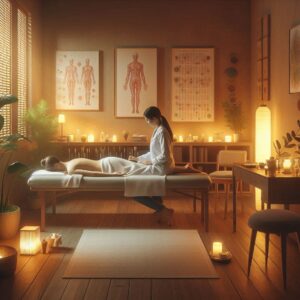Unlock the Healing Potential of Acupuncture to Effectively Combat Insomnia
Insomnia is a prevalent sleep disorder that can drastically hinder your daily life by making it challenging to fall asleep, remain asleep, or attain the deep, restorative rest that your body needs for optimal functioning. This condition can vary from a temporary issue that lasts a few nights to a chronic ailment enduring for months or even years. Various triggers contribute to insomnia, including stress, worry, underlying depression, irregular sleep schedules, certain medications, excessive caffeine intake, and a spectrum of medical conditions. By pinpointing these potential triggers, you can devise effective treatment strategies aimed at not only restoring healthy sleep patterns but also enhancing your overall health and quality of life.
The continuous struggle with inadequate sleep can lead to significant consequences for your physical and emotional well-being. Chronic sleep deprivation can weaken the immune system, elevate the risk of severe health issues such as cardiovascular diseases, increase susceptibility to disorders like diabetes, contribute to obesity, and impair cognitive functions. On an emotional level, the repercussions can manifest as increased anxiety, depression, mood fluctuations, and irritability, severely affecting mental health. Furthermore, deficits in attention, memory, and decision-making can exacerbate the difficulties linked to chronic insomnia. Therefore, it is essential to recognize and address the root causes of insomnia to alleviate these negative health impacts and restore a sense of well-being.
Essential Understanding of Insomnia and Its Significant Effects on Overall Health
- Insomnia is a complex sleep disorder marked by challenges in falling asleep, staying asleep, or waking up too early, all of which can detrimentally affect overall health and productivity.
- This condition may stem from multiple sources, including stress, anxiety, depression, poor sleep hygiene, and certain medications, all of which can disrupt normal sleep patterns and routines.
- Long-term sleep deprivation can severely undermine your health, leading to a weakened immune system, heightened risk of chronic diseases, decreased cognitive function, and emotional instability.
- Acupuncture enhances sleep quality by stimulating specific acupoints, which aids in balancing the body’s energy flow and induces a state of deep relaxation.
- Numerous studies support the idea that acupuncture can significantly improve sleep quality and relieve various symptoms associated with insomnia.
- This ancient practice effectively addresses insomnia by relieving anxiety, promoting relaxation, and restoring equilibrium to the body’s energy systems.
- Research indicates that acupuncture may enhance melatonin production, assist in regulating the circadian rhythm, and improve overall sleep quality.
- Common acupoints utilized in insomnia treatment include Shenmen, Sishencong, Anmian, and Yin Tang, each celebrated for its therapeutic effects.
- Qualified practitioners use fine needles to stimulate targeted points, encouraging tranquility, reducing stress, and improving sleep quality.
- Acupoints such as Shenmen are known for their calming properties, while Anmian is effective in quieting the mind and enhancing sleep.
- Traditional Chinese medicine emphasizes the significance of maintaining balanced energy flow and harmony between yin and yang to facilitate quality sleep.
- Incorporating herbal remedies like chamomile, valerian root, and lavender, along with dietary recommendations for warm, easily digestible foods, can greatly enhance sleep quality.
- Utilizing traditional Chinese medicine techniques, including acupressure, herbal therapies, and Qi Gong, can complement acupuncture in managing insomnia.
- During an acupuncture session for insomnia, practitioners conduct a thorough consultation to assess your sleep habits, lifestyle choices, and overall health status.
- The insertion of fine needles into specific acupoints aims to promote relaxation, alleviate stress, and enhance overall sleep quality.
- Multiple sessions over weeks or months may be necessary to achieve optimal results in effectively managing insomnia.
- Creating a sleep-friendly environment is crucial; minimizing noise and light disturbances, maintaining a comfortable room temperature, and incorporating relaxation techniques like meditation or deep breathing can significantly enhance sleep quality.
- Establishing a consistent sleep schedule, avoiding caffeine and screen exposure before bedtime, and engaging in regular physical activity can dramatically improve sleep quality.
- Employing stress management techniques such as yoga, meditation, or tai chi can further augment the effectiveness of your insomnia treatment.
- Collaborating with healthcare professionals, including psychologists, nutritionists, or sleep specialists, can effectively integrate acupuncture with other insomnia management methods.
- Complementary therapies like yoga, meditation, or massage can foster relaxation, reduce stress, and improve sleep quality.
- Addressing underlying health issues such as anxiety, depression, or chronic pain is essential for comprehensive relief from insomnia.
 How Acupuncture Effectively Enhances Sleep Quality
How Acupuncture Effectively Enhances Sleep Quality
Acupuncture has been recognized for centuries as a cornerstone of traditional Chinese medicine (TCM), revered for its soothing effects and ability to promote restorative sleep. This holistic approach emphasizes the regulation of the body’s energy flow, or qi, by stimulating specific acupoints. By positively influencing the nervous system, reducing stress and anxiety levels, and correcting internal imbalances that lead to insomnia, acupuncture can significantly improve sleep quality. This ancient practice not only helps decrease the frequency of nighttime awakenings but also fosters a deep sense of relaxation and well-being, thereby maximizing the restorative benefits of sleep.
A growing body of scientific research and clinical studies consistently highlights the positive impacts of acupuncture on sleep quality. For example, a notable study published in The Journal of Alternative and Complementary Medicine found that participants with insomnia experienced significant enhancements in their sleep quality after undergoing acupuncture treatment. Additionally, research published in the Journal of Sleep Research confirmed that acupuncture effectively reduced the severity of insomnia while enhancing overall sleep quality. These compelling findings underscore acupuncture’s potential as a safe, natural therapeutic option for individuals battling sleep disturbances.
Identifying Key Acupuncture Points to Promote Better Sleep Quality
Experienced acupuncturists strategically target specific acupoints to effectively tackle insomnia and improve sleep quality. These acupoints play an essential role in addressing sleep-related challenges. For instance, the Shenmen point, situated on the wrist, is well-known for its calming effects on both the mind and body. Another important point, Sanyinjiao, located on the lower thigh, is thought to nourish blood and yin, leading to reduced anxiety and heightened relaxation. The Anmian point, found behind the ear, is frequently used to alleviate insomnia and encourage a peaceful night’s rest. The Yintang point, positioned between the eyebrows, is celebrated for its soothing effects on mental clarity and tranquility.
During acupuncture sessions, practitioners carefully insert small needles into the skin at precise depths to effectively stimulate these particular points. This stimulation is believed to help regulate the body’s energy flow, fostering a sense of balance and harmony within. Consequently, many individuals report a marked reduction in insomnia symptoms and a significant improvement in sleep quality following treatment.
Exploring the Holistic Principles of Traditional Chinese Medicine for Improved Sleep
Traditional Chinese medicine (TCM) adopts a holistic perspective on health and wellness, acknowledging the intricate connections between the body’s systems and the significance of balance for optimal well-being. TCM principles related to sleep underscore the necessity of restoring internal harmony to facilitate restful slumber. Herbal remedies are often prescribed to address imbalances that lead to sleep disturbances. Herbs such as valerian root, chamomile, lavender, and passionflower are acclaimed for their calming properties, assisting in achieving deeper, more restorative sleep. These natural remedies are believed to promote physical relaxation and enhance overall sleep quality.
In their practice, TCM practitioners frequently provide dietary advice designed to support and improve sleep quality. Individuals suffering from insomnia are often encouraged to consume foods that nourish the blood and yin. This may include dark leafy greens, nuts, seeds, and seafood, all of which contribute to overall health. Moreover, practices like Qigong, tai chi, and acupressure, along with other TCM therapies, can effectively alleviate insomnia by promoting relaxation, reducing stress, and enhancing overall well-being, ultimately leading to improved sleep quality.
 What to Anticipate During Your First Acupuncture Session for Insomnia Relief
What to Anticipate During Your First Acupuncture Session for Insomnia Relief
Upon your arrival for your initial acupuncture session specifically aimed at alleviating insomnia, the acupuncturist will conduct a thorough assessment of your sleep patterns, overall health, and any underlying factors that may contribute to your sleeplessness. Utilizing their expertise, the acupuncturist will develop a personalized treatment plan tailored to your unique needs and circumstances, ensuring a targeted approach to your insomnia.
The acupuncture treatment process involves the gentle insertion of fine needles into designated points on your body. Patients are typically encouraged to relax for 20 to 30 minutes while the needles remain in place. During this period, individuals may experience a gentle tingling sensation or mild discomfort; however, the overall experience is often described as calming and soothing, creating an environment conducive to sleep.
The timing and frequency of acupuncture sessions may vary based on the severity of insomnia and individual responses to the treatment. While some patients notice improvements in their sleep quality after just a few sessions, others may require ongoing treatment to achieve more enduring benefits.
Implementing Lifestyle Changes to Maximize Acupuncture’s Effectiveness for Insomnia
In addition to acupuncture, integrating specific lifestyle changes can significantly enhance your sleep quality. Crafting a sleep-conducive environment is vital for optimizing your overall sleep experience. This includes ensuring that your bedroom is dark, quiet, and calm, using comfortable bedding and pillows, and establishing a relaxing bedtime routine that signals to your body that it’s time to unwind.
Embracing healthy habits can greatly improve sleep quality. This encompasses maintaining a consistent sleep schedule, avoiding caffeine and electronic devices in the hours leading up to bedtime, incorporating regular physical activity into your daily routine, and practicing relaxation techniques like deep breathing or meditation to quiet the mind and prepare for rest.
Effective stress management techniques can greatly enhance the results of acupuncture treatment for insomnia. Engaging in activities such as yoga, meditation, or massage therapy can help alleviate anxiety and promote relaxation. These practices provide essential support to help you unwind, making it easier to both fall asleep and maintain sleep throughout the night.
 Integrating Acupuncture with Additional Strategies for Comprehensive Insomnia Relief
Integrating Acupuncture with Additional Strategies for Comprehensive Insomnia Relief
Under the guidance of a skilled practitioner, acupuncture can become a vital component of a comprehensive approach to managing insomnia, offering much-needed relief for those struggling with sleep disorders. Collaborating with other healthcare professionals, such as primary care physicians or mental health specialists, is crucial for providing holistic care to individuals experiencing insomnia.
By combining acupuncture with complementary practices like yoga, meditation, and massage therapy, individuals can develop a well-rounded strategy to promote relaxation and reduce stress, leading to improved sleep quality. These methods can be seamlessly integrated into a personalized treatment plan designed to meet each individual’s unique needs, ensuring they feel supported and understood throughout their journey.
Furthermore, it is essential to address any underlying health issues that may worsen insomnia. Treating chronic pain, anxiety, depression, or other medical conditions that interfere with sleep quality can be integral to the overall treatment process. Those who adopt a holistic perspective on their health and wellness can significantly enhance both their sleep quality and quality of life.
Ultimately, insomnia can have a profound impact on both physical and emotional well-being, underscoring the need to explore effective treatment options. A knowledgeable practitioner can utilize acupuncture to improve sleep quality by addressing imbalances within the body and fostering a sense of tranquility. By integrating lifestyle modifications, principles from traditional Chinese medicine, and other complementary therapies, acupuncture can significantly enhance both sleep quality and overall well-being. This holistic approach offers hope and optimism for individuals seeking relief from insomnia.
 Frequently Asked Questions About Acupuncture and Insomnia Relief
Frequently Asked Questions About Acupuncture and Insomnia Relief
What Is Acupuncture and What Benefits Does It Provide?
Acupuncture is a time-honored practice rooted in traditional Chinese medicine, where trained practitioners insert thin needles into specific points on the body. This technique promotes the flow of energy and enhances the body’s natural healing processes, aiding in the relief of a variety of health issues, including insomnia.
How Is Insomnia Defined in Medical Terms?
Insomnia is a sleep disorder that disrupts the ability to fall asleep, maintain sleep, or achieve restorative sleep. This persistent condition often results in daytime fatigue and diminished functionality, making it essential to pursue effective treatment solutions.
In What Ways Does Acupuncture Alleviate Insomnia Symptoms?
Acupuncture has been demonstrated to positively influence insomnia by restoring balance to the body’s nervous system, relieving stress and anxiety, and inducing a state of relaxation. This approach ultimately enhances both the quality and duration of sleep, establishing acupuncture as an effective treatment alternative.
Are There Scientific Studies Supporting the Efficacy of Acupuncture for Insomnia Relief?
A variety of studies suggest that acupuncture can improve sleep quality and reduce insomnia symptoms. While evidence supports its benefits, further research is necessary to solidify these findings and arrive at more definitive conclusions regarding its effectiveness.
What Can I Expect During an Acupuncture Session Focused on Insomnia?
During an acupuncture session, a trained practitioner carefully inserts slender needles into specific points on your body associated with promoting sleep and relaxation. The needles are typically left in place for 15 to 30 minutes while you unwind and embrace a state of tranquility.
Are There Any Potential Side Effects Associated with Acupuncture for Insomnia?
When performed by a trained and experienced practitioner, acupuncture is generally considered safe. However, some individuals may experience minor side effects such as tenderness, discoloration, or slight bleeding at the sites where needles are inserted.
Can Acupuncture Function as a Standalone Treatment for Insomnia?
Acupuncture can be an effective treatment for insomnia when integrated with complementary strategies such as lifestyle modifications, relaxation techniques, and cognitive behavioral therapy for insomnia (CBT-I), creating a comprehensive treatment plan tailored to individual needs.
How Many Acupuncture Sessions Are Typically Required to Observe Improvements in Insomnia?
The number of acupuncture sessions necessary to see improvements in insomnia varies based on individual circumstances and the severity of symptoms. Many individuals report enhancements after just a few sessions, while others may require ongoing treatment for sustained benefits.
Provided By:
References
If You Only Get 3 Hours of Sleep One Night – What Happens – Themes Quality. https://www.themesquality.com/what-happens-if-you-only-get-3-hours-of-sleep-for-one-night/
Sleep Better with 30 Essential Oils: A Natural Remedy for Insomnia and Restless Nights – Hotnewamapiano. https://hotnewamapiano.com/2023/02/11/sleep-better-with-30-essential-oils-a-natural-remedy-for-insomnia-and-restless-nights/
Migraines Helped by Acupuncture. https://www.ncbi.nlm.nih.gov/pmc/articles/PMC3291665/
The Article: Acupuncture Techniques for Improving Sleep Quality appeared first on Acupuncture Blackpool.
The Article Acupuncture Techniques for Better Sleep Quality appeared first on https://mcrtherapies.com
The Article Acupuncture Techniques for Better Sleep Quality Was Found On https://limitsofstrategy.com


One response
I really appreciate how you highlighted the various triggers of insomnia; it feels so relatable. I’ve definitely found myself caught in that vicious cycle of stress and late nights, which usually just leads to more anxiety. It’s interesting how, in our fast-paced world, people often overlook the importance of quality sleep. I’ve tried a bunch of remedies over the years, from herbal teas to sleep apps that track my sleep patterns, but I’ve never given acupuncture a real shot.